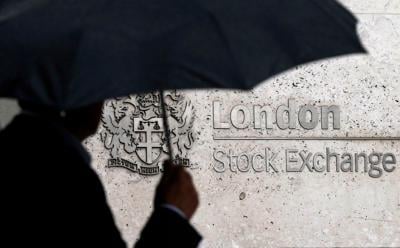
A man shelters under an umbrella as he walks past the London Stock Exchange in London, Britain, Aug. 24, 2015.
LONDON/SYDNEY (Reuters) — World shares dipped on Monday after a mixed U.S. jobs report triggered a rally in beaten-down bonds, but new hurdles lay ahead in the shape of U.S. and Chinese inflation figures due later this week.
MSCI's broadest index of shares edged 0.2% lower in thin trade, after losing 2.6% last week.
European shares fell 0.3%, weighed down by heavyweight mining, luxury and oil stocks, which were only in part offset by gains in defensive drugmakers.
Meanwhile in the U.S., stock markets looked set to open higher. S&P index futures added 0.2%, while Nasdaq futures ticked up 0.4%.
With roughly 90% of S&P 500 earnings reported, results are 4% better than consensus estimates, with more than 79% of companies beating the Street, according to Refinitiv I/B/E/S data. Results due this week include Walt Disney and News Corp.
Data on U.S. consumer prices are forecast to show headline inflation picking up slightly to an annual 3.3%, but the more important core rate is seen slowing to 4.7%.
"Markets are waiting to see this week's CPI reports out of the US and China," said Michael Hewson, chief market analyst at CMC Markets.
While bond markets might be driven this week by the U.S. bond issuance that has "played havoc" with yields, many economic data points show "significant disinflation is starting to take hold," he said.
U.S. yields rose by 3-4 basis points or bps after falling more than 10 bps on Friday.
"Some of the Fed comments over the weekend from Michelle Bowman came in more hawkish than people expected. Currently, there's a wider band of uncertainty that pervades markets," said James Rossiter, head of global macro strategy at TD Securities in London.
The U.S. Federal Reserve will likely need to raise interest rates further to bring down inflation, Bowman said on Saturday.
Futures imply only a 12% chance of a Fed rate hike in September, and 24% for a rise by year-end.
Analysts argued this week that Treasury supply hitting the market could also pressure rates higher, as bond prices fall.
Fitch downgraded the United States' credit rating last week, and the Treasury Department announced an offering of $103 billion in Treasuries as it faced a growing deficit and the need to balance the overall profile of its debt issues.
Michael Gapen, an economist at BofA, warned that the market was still expecting too much policy easing next year given the recent run of resilient economic data.
"We now expect a soft landing for the U.S. economy, not the mild recession we had previously forecasted," Gapen wrote.
As a result, the bank raised its year-end forecast for two-year and 10-year yields by 50 bps to 4.75% and 4%, respectively.
The shift in yields gave a small boost to the U.S. dollar, which was 0.2% firmer against a basket of currencies at 102.310.
The euro eased 0.3% to $1.0976, having bounced from a trough of $1.0913 last week.
The strength in the dollar nudged gold down 0.4% to $1,935 an ounce.
Oil prices paused having rallied for six straight weeks amid tightening supplies. The 17% climb in Brent combined with upward pressure on food prices from the war in Ukraine and global warming is a threat to hopes for continued disinflation across the developed world.
Brent was off 85 cents at $85.39 a barrel, while U.S. crude fell 88 cents to $81.94.















